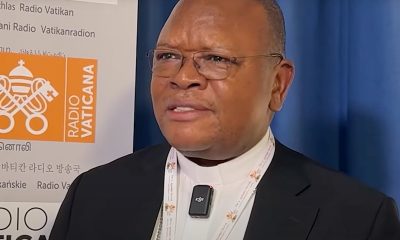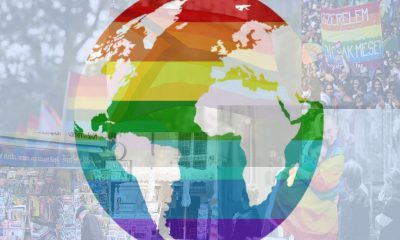World
Out in the World: LGBTQ news from Europe and Canada
Three Taylor Swift concerts in Vienna cancelled after attack plot uncovered

BULGARIA
Parliament rushed through passage of a Russia-style “LGBT propaganda” law Aug. 7 in a marathon session that was marked by speeches that queer activists have denounced as bordering on hate speech, and that sparked protests around the capital.
The vaguely worded law bans “propaganda, popularization and encouragement, directly or indirectly, of ideas and views connected to nontraditional sexual orientation or to gender-identifying different from the biological,” in Bulgarian schools. The law does not prescribe any specific punishment for infractions.
The bill was introduced by the Revival Party, which maintains strong ties to Russia’s government, but passed with surprising support from the pro-European Union center-right GERB party. Altogether, 159 MPs voted for the bill, while only 57 voted against it, mostly from the reformist We Continue the Change Party.
Bulgaria is currently without an elected government, as June national elections yielded a hung parliament. Fresh elections are scheduled for Oct. 20 — Bulgaria’s fifth election in three years. Parties are likely using the threat of “LGBT propaganda” to shore up votes.
Nevertheless, the passage of the law sparked protests from queer, women, and human rights groups around the capital, Sofia, calling on President Rumen Radev to veto the law.
“This is the first step in making non-traditional sexual orientation a crime. I consider this absolutely unacceptable and out of the spirit of what we strive to be as a country and society,” Ivan Ivanov, a protestor at the Aug. 7 rally, told Euronews.
Anti-LGBTQ “propaganda” laws have been spreading since Russia passed its law in 2013. Hungary and Lithuania have laws restricting LGBTQ speech in schools or around children, but Bulgaria is the first EU country to pass such a law since the European Court of Human Rights ruled that Lithuania’s law breached the European Convention in January 2023.
Other countries considering such laws right now are Georgia and Kazakhstan. Several African states have also recently passed or are considering laws criminalizing promotion of LGBTQ rights, including Uganda, Ghana, Namibia, and Liberia. Increasingly, similar laws are also being passed in Republican-led U.S. states.
AUSTRIA
Local organizers Taylor Swift’s Eras Tour cancelled three dates in Vienna after authorities arrested two suspected extremists on charges that they planned to attack a concert.
Swift had been scheduled to play at the Ernst Happel Stadium on Aug. 9, 10, and 11.
Authorities said they had arrested a 19-year-old main suspect in Ternitz, about 50 miles south of Vienna, and a second 17-year-old suspect in the capital.
Omar Haijawi-Pirchner, head of Austria’s Directorate of State Security and Intelligence, says the 19-year-old had been radicalized in the direction of the Islamic State, and that they had found material related to the Islamic State and al-Qaeda at the home of the 17-year-old.
Haijawi-Pirchner says that the suspect was employed by a company providing services at the concerts and was planning to use knives or self-made explosives to “kill as many people as possible” at the concert.
Initially, promoters said the concerts would go ahead with extra security provided by the national police, but the dates were quickly cancelled hours later.
Promoters Barracuda Music said all tickets would be automatically refunded within 10 business days.
The concert dates had been sold out for months, with an estimated 170,000 people expected to attend.
This isn’t the first time an Islamic extremist has allegedly targeted a pop concert. In 2017, an extremist suicide-bombed an Ariana Grande concert in Manchester, England, killing 22 people and wounding more than 100.
CANADA
The Supreme Court has refused to hear an appeal from alt-right figure Jordan Peterson of the decision by the College of Psychologists of Ontario requiring him to undergo social media training or risk losing his license to practice.
Peterson, who rose to international prominence for his strident opposition to a transgender rights bill passed by the Canadian government in 2017, has become a darling of the alt-right movement for his writings and social media posts advancing frequently misogynistic and transphobic views on women, masculinity, and gender identity, as well as general antipathy to other left-wing issues.
In 2022, the College of Psychologists found that his posts may be “degrading” and call into question his ability as a psychologist and bring the profession disrepute. It ordered he undergo social media training.
Peterson sought judicial review, but he lost at lower courts. The Supreme Court did not give reasons why it dismissed the appeal. Peterson was ordered to pay costs.
Initially, Peterson said he would continue to fight the order, somehow, but days later his lawyer had told CBC that Peterson would attend the training.
The case has divided rights groups in Canada, with the LGBTQ advocacy group Egale intervening on behalf of the College of Psychologists of Ontario, while the Canadian Civil Liberties Union intervened on behalf of Peterson, arguing that professional associations shouldn’t regulate speech unrelated to the profession.
Conservative Party leader Pierre Poilievre, who has also courted the alt-right and far right in Canada, also posted in support of Peterson.
“Another government bureaucracy threatens to ban a Canadian from practicing his profession because he expressed political opinions the state doesn’t like,” he wrote on X, formerly Twitter.
The College of Psychologists of Ontario is not a government bureaucracy. It is a professional association.
BELGIUM
Former Belgian Prime Minister Elio Di Rupo spoke out against transphobia in an open letter after the current deputy prime minister raised alarms this week by recommending a transphobic book on his social media channels.
Deputy Prime Minister David Clarinval of the center-right Reformist Movement was accused of transphobia after he posted on X praise of the book “Transmania: Investigation into the Excesses of Transgender Ideology” by Marguerite Stern and Dora Moutot.
The book, originally published in France, is full of conjectures and conspiracy theories asserting that trans people aren’t real and that they are associated with pedophilia. It has become a symbol of the far right in France since it was published in April 2023.
Clarinval defended his post to the Brussels Times.
“This book gives a broader view of the transgender issue,” he said.
Di Rupo, who was Belgium’s first openly gay prime minister and now serves as a member of the European Parliament, wrote an open letter calling for conservatives and liberals to agree to protect all people’s rights in the wake of the controversy.
“In this reactionary climate, it is essential to emphasize that the freedoms granted to transgender people in no way diminish the freedoms of other citizens. The extension of rights and freedoms to some never diminishes those of others,” Di Rupo writes.
“Finally, it is important to remember that the freedoms we enjoy today are the fruit of fierce struggles, countless political battles and incalculable human tragedies. They are indeed heroic struggles, often marked by great suffering and sacrifice, that have shaped the free world in which we live in the West. Whether it is the fights for civil rights in the United States, for gender equality, for the rights of LGBTQIA+ people or for freedom of expression, they have all been driven by the same unwavering will: That of defending the dignity, freedom and respect of the human being in all its complexity.”
El Salvador
La marcha LGBTQ+ desafía el silencio en El Salvador
Se realizó el evento en San Salvador bajo la lluvia, pero con orgullo

SAN SALVADOR, El Salvador — El reloj marcaba el mediodía cuando los primeros colores del arcoíris comenzaron a ondear frente a la emblemática Plaza del Divino Salvador del Mundo. A pesar de la incertidumbre generada en redes sociales, donde abundaban los rumores sobre una posible cancelación de la marcha por la diversidad sexual, la ciudad capital comenzaba a llenarse de esperanza, de resistencia y de orgullo.
Este año, la Marcha del Orgullo LGBTQ+ en El Salvador se desarrolló en un contexto tenso, en medio de un clima político que reprime y silencia a las voces disidentes.
“Aunque las estadísticas digan que no existimos, viviendo en El Salvador, un país donde hoy, después de décadas de avances, defender los derechos humanos es de nuevo una causa perseguida, criminalizada y silenciada”, afirmaron representantes de la Federación Salvadoreña LGBTQ+.
A pesar de la cancelación del festival cultural que usualmente acompaña la marcha, los colectivos decidieron seguir adelante con la movilización, priorizando el sentido original de la actividad: salir a las calles para visibilizarse, exigir respeto a sus derechos y recordar a quienes ya no están.
A la 1:30 p.m., una fuerte lluvia comenzó a caer sobre la ciudad. Algunas de las personas presentes corrieron a refugiarse, mientras otras, debajo de sombrillas y de los escasos árboles en la plaza, decidieron mantenerse firmes. Los comentarios pesimistas no se hicieron esperar: “a lo mejor la cancelan por el clima”, “no se ve tanta gente como otros años”. Sin embargo, lo que siguió fue una muestra de resistencia: a las 2:05 p.m. las voces comenzaron a llamar a tomar las calles.
Visibilidad como resistencia
La marcha arrancó bajo una llovizna persistente. La Avenida Roosevelt y la Alameda Juan Pablo II se tiñeron de colores con banderas arcoíris, trans, lésbicas, bisexuales y otras que representan a los diversos sectores de la población LGBTQ+. Cada bandera alzada fue un acto político, cada paso una declaración de existencia.
Desde la Plaza del Divino Salvador del Mundo hasta la Plaza Gerardo Barrios, frente a Catedral Metropolitana y el Palacio Nacional, la marcha se convirtió en un carnaval de dignidad. Carteles con frases como “El amor no se reprime”, “Mi existencia no es delito” o “Marcho por quien ya no puede hacerlo” se alzaron entre las multitudes.
La movilización fue también un espacio para recordar a quienes han perdido la vida por la discriminación y el rechazo. Familias que marcharon por hijos, hijas o amigues que se suicidaron a causa del estigma. Personas que caminaron por quienes aún viven en el miedo, por quienes no pudieron salir del clóset, por quienes se han ido del país huyendo de la violencia.
Arte, fe y rebeldía
Una de las escenas más llamativas fue protagonizada por Nelson Valle, un joven gay que marchó vestido como sacerdote.
“Hay muchas personas que secretamente asisten a ritos religiosos como en Semana Santa, y les gusta vivir en lo oculto. Pero la fe debe ser algo libre porque Dios es amor y es para todos”, dijo.
Valle utilizó su vestimenta como una forma de protesta contra las estructuras religiosas que aún condenan la diversidad sexual.
“Un ejemplo de persona que abrió el diálogo del respeto fue el papa Francisco, abrió la mente y muy adelantado a su tiempo, porque dejó claro que hay que escuchar a toda persona que quiere encontrar a Dios”, agregó.
La marcha también incluyó bandas musicales, grupos de cachiporristas, carrozas artísticas, colectivos provenientes de distintos puntos del país, y manifestaciones de orgullo en todas sus formas. Fue un mosaico cultural que mostró la riqueza y diversidad de la población LGBTQ+ en El Salvador.

Una lucha que persiste
Las organizaciones presentes coincidieron en su mensaje: la lucha por la igualdad y el reconocimiento no se detiene, a pesar de los intentos del Estado por invisibilizarlos.
“Nuestros cuerpos se niegan a ser borrados y a morir en la invisibilidad de registros que no guardan nuestros nombres ni nuestros géneros”, declararon representantes de la Federación.
Además, agregaron: “Desde este país que nos quiere callar, levantamos nuestras voces: ¡La comunidad LGBTIQ+ no se borra! ¡El Salvador también es nuestro! Construyamos, entre todes, un país donde podamos vivir con Orgullo.”
El ambiente fue de respeto, pero también de desconfianza. La presencia de agentes policiales no pasó desapercibida. Aunque no hubo reportes oficiales de violencia, varias personas expresaron su temor por posibles represalias.
“Marchar hoy es también un acto de valentía”, comentó Alejandra, una joven lesbiana que viajó desde Santa Ana para participar. “Pero tenemos derecho a vivir, a amar, a soñar. Y si nos detenemos, les damos la razón a quienes nos quieren ver en silencio.”
Rumbo al futuro
Concluida la marcha frente a Catedral y el Palacio Nacional, muchas personas permanecieron en la plaza compartiendo abrazos, fotos y palabras de aliento. No hubo festival, no hubo escenario, pero hubo algo más valioso: una comunidad que sigue viva, que sigue resistiendo.
Los retos son muchos: falta de leyes de protección y que apoye las identidades de las personas trans, discriminación laboral, violencia por prejuicio, rechazo familiar, y una narrativa estatal que pretende que no existen. Pero la marcha del 28 de junio demostró que, aunque el camino sea cuesta arriba, la dignidad y el orgullo no se borran.
La lucha por un El Salvador más justo, más plural y más inclusivo continúa. En palabras de uno de los carteles más llamativos de ese día: “No estamos aquí para pedir permiso, estamos aquí para recordar que también somos parte de este país”.
Colombia
Colombia avanza hacia la igualdad para personas trans
Fue aprobado en Comisión Primera de la Cámara la Ley Integral Trans

En un hecho histórico para los derechos humanos en Colombia, la Comisión Primera de la Cámara de Representantes aprobó en primer debate el Proyecto de Ley 122 de 2024, conocido como la Ley Integral Trans, que busca garantizar la igualdad efectiva de las personas con identidades de género diversas en el país. Esta iniciativa, impulsada por más de cien organizaciones sociales defensoras de los derechos LGBTQ+, congresistas de la comisión por la Diversidad y personas trans, representa un paso decisivo hacia el reconocimiento pleno de derechos para esta población históricamente marginada.
La Ley Integral Trans propone un marco normativo robusto para enfrentar la discriminación y promover la inclusión. Entre sus principales ejes se destacan el acceso a servicios de salud con enfoque diferencial, el reconocimiento de la identidad de género en todos los ámbitos de la vida, la creación de programas de empleo y educación para personas trans, así como medidas para garantizar el acceso a la justicia y la protección frente a violencias basadas en prejuicios.
Detractores hablan de ‘imposición ideológica
Sin embargo, el avance del proyecto no ha estado exento de polémicas. Algunos sectores conservadores han señalado que la iniciativa representa una “imposición ideológica”. La senadora y precandidata presidencial María Fernanda Cabal anunció públicamente que se opondrá al proyecto de Ley Integral Trans cuando llegue al Senado, argumentando que “todas las personas deben ser tratadas por igual” y que esta propuesta vulneraría un principio constitucional. Estas declaraciones anticipan un debate intenso en las próximas etapas legislativas.
El proyecto también establecelineamientos claros para que las instituciones públicas respeten el nombre y el género con los que las personas trans se identifican, en concordancia con su identidad de género, y contempla procesos de formación y sensibilización en entidades estatales. Además, impulsa políticas públicas en contextos clave como el trabajo, la educación, la cultura y el deporte, promoviendo una vida libre de discriminación y con garantías plenas de participación.
¿Qué sigue para que sea ley?
La Ley aún debe superar varios debates legislativos, incluyendo la plenaria en la Cámara y luego el paso al Senado; pero la sola aprobación en Comisión Primera ya constituye un hito en la lucha por la igualdad y la dignidad de las personas trans en Colombia. En un país donde esta población enfrenta altos niveles de exclusión, violencia y barreras estructurales, este avance legislativo renueva la esperanza de una transformación real.
Desde www.orgullolgbt.co, celebramos este logro, invitamos a unirnos en esta causa impulsándola en los círculos a los que tengamos acceso y reiteramos nuestro compromiso con la visibilidad, los derechos y la vida digna de las personas trans. La #LeyIntegralTrans bautizada “Ley Sara Millerey” en honor de la mujer trans recientemente asesinada en Bello, Antioquia (ver más aquí); no es solo una propuesta normativa: es un acto de justicia que busca asegurar condiciones reales para que todas las personas puedan vivir con libertad, seguridad y respeto por su identidad.
Argentina
Two trans women document Argentina military dictatorship’s persecution
Carolina Boetti and Marzia Echenique arrested multiple times after 1976 coup

Editor’s note: Los Angeles Blade International News Editor Michael K. Lavers was on assignment in Argentina and Uruguay from April 2-12, 2025.
ROSARIO, Argentina — Two transgender women in Argentina’s Santa Fe province are documenting the persecution of trans people that took place during the brutal military dictatorship that governed their country from 1976-1983.
Carolina Boetti and Marzia Echenique created the Travestí Trans Santa Fe Archive, which seeks to “create a collective memory,” in 2020. (“Travestí” is the Spanish word for “crossdresser.”)
The archive, among other things, includes interviews with trans women who the dictatorship arrested and tortured. The archive also contains photographs from that period.
The archive is not in a specific location, but Boetti and Echenique have given presentations at local schools and universities. They have also spoken at a museum in Rosario, the largest city in Santa Fe province that is roughly 200 miles northwest of Buenos Aires, the Argentine capital, that honors the dictatorship’s victims.
Boetti and Echenique during an April 11 interview at a Rosario hotel said they are trying to raise funds that would allow them to digitize the archive and house it in a permanent location.
“We have this material that is fantastic,” said Boetti.
The Associated Press notes human rights groups estimate the dictatorship killed or forcibly disappeared upwards of 30,000 people in what became known as the “dirty war.” The dictatorship specifically targeted students, journalists, labor union leaders, and anyone else who it thought posed a threat.
The dictatorship first detained Echenique in 1979 when she was 16. She said it targeted her and other trans women because they were “not within that strict” binary of man and woman.
“There was a dictator during the dictatorship, and he dictated this binarism, and there was no other way than man or woman,” Echenique told the Blade. “Everything else was penalized, deprived of all rights. They took away everything.”
Boetti was 15 when the dictatorship first detained her.
“They detained me because of my sexual orientation,” she told the Blade. “Homosexuality in those years was penalized under the law.”
Boetti said the law in 1982 — the year when she began her transition — penalized crossdressing, prostitution and vagrancy with up to 120 days in jail. Boetti told the Blade that authorities “constantly detained me” from 1982 until she left Argentina in the 1990s.
Echenique said the regime once detained her for six months.
“The way of living, of studying, of walking freely down the street, of living somewhere, of sitting down to eat something in a bar or how we are sitting today, for example, was unthinkable in those years,” she said.
Echenique left Argentina in 1988, three years after the dictatorship ended. She returned to the country in 2006.
“The dictatorship ended in ’83, but not for the trans community,” she said.
Rosario and Santa Fe, the provincial capital, in 2018 implemented a reparation policy for trans people who suffered persecution under the dictatorship. They remain the only cities in Argentina with such a program.
Boetti on May 17, 2018, during an International Day Against Homophobia, Biphobia, and Transphobia ceremony over which then-Santa Fe Gov. Miguel Lifshitz presided became the first trans person in Argentina to receive reparations. Boetti receives a monthly pension of ARG 40,000 ($34.48) and a monthly stipend that pays for her health care.
Those who have received reparations successfully presented evidence to a judge that proved they suffered persecution and repression during the dictatorship. Boetti and Echenique pointed out that only 10 of the 50 trans women in Santa Fe who the dictatorship are known to have persecuted are still alive.

Post-dictatorship Argentina became global trans rights leader
Then-President Cristina Fernández de Kirchner in 2012 signed Argentina’s landmark Gender Identity Law that, among other things, allows trans and nonbinary people to legally change their gender without medical intervention. The country in 2010 extended marriage rights to same-sex couples.
Then-President Alberto Fernández, who is unrelated to Cristina Fernández, in 2020 signed the Trans Labor Quota Law, which set aside at least 1 percent of public sector jobs for trans people. Fernández in 2021 issued a decree that allowed nonbinary Argentines to choose an “X” gender marker on their National Identity Document or DNI.
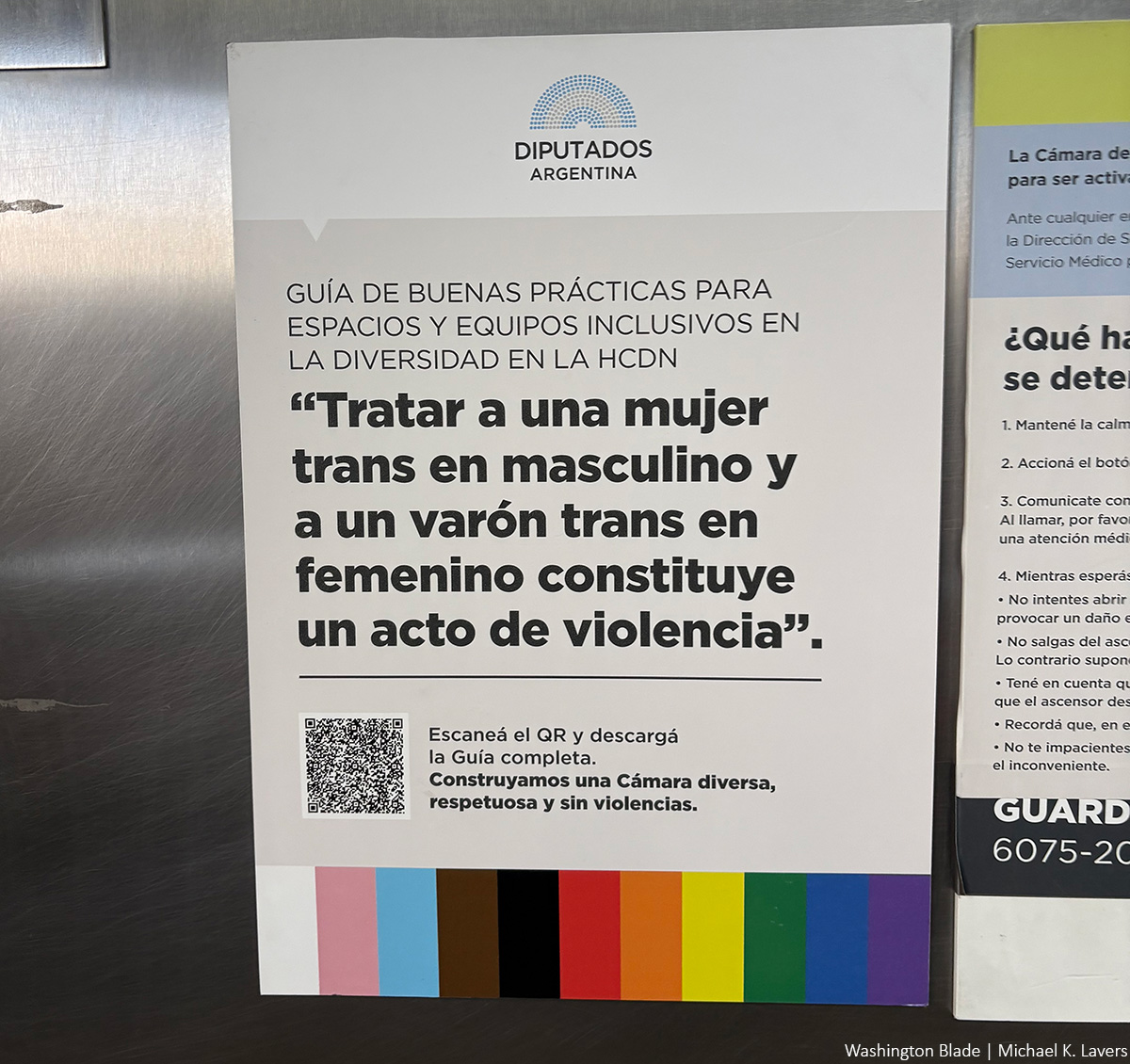
Alba Rueda, a trans woman and well-known activist, in 2022 became Argentina’s special envoy for LGBTQ+ and intersex rights.
President Javier Milei has implemented several anti-trans measures since he took office in December 2023. These include a decree that restricts minors’ access to gender-affirming surgeries and hormone treatment and the dismissal of trans people who the government hired under the Trans Labor Quota Law.
Milei closed the National Institute Against Discrimination, Xenophobia, and Racism, a government agency known by the acronym INADI that provided support and resources to people who suffered discrimination based on sexual orientation, gender identity, and other factors. He also eliminated Argentina’s Women, Gender, and Diversity Ministry under which Rueda worked until Fernández left office.

Gay Congressman Esteban Paulón, a long-time LGBTQ+ activist, in January filed a criminal complaint against Milei after he linked the LGBTQ+ community to pedophilia and made other homophobic and transphobic comments during a speech at the World Economic Forum in Davos, Switzerland. Paulón is among those who attended the 2018 ceremony during which Boetti received her reparations.
Echenique noted the restoration of democracy in Argentina did not end anti-trans discrimination and persecution in the country.
“We came from the period of the dictatorship, but we do not forget that everything didn’t end then,” she said. “The persecutions were worse than what we suffered during the period of the dictatorship once democracy returned.”
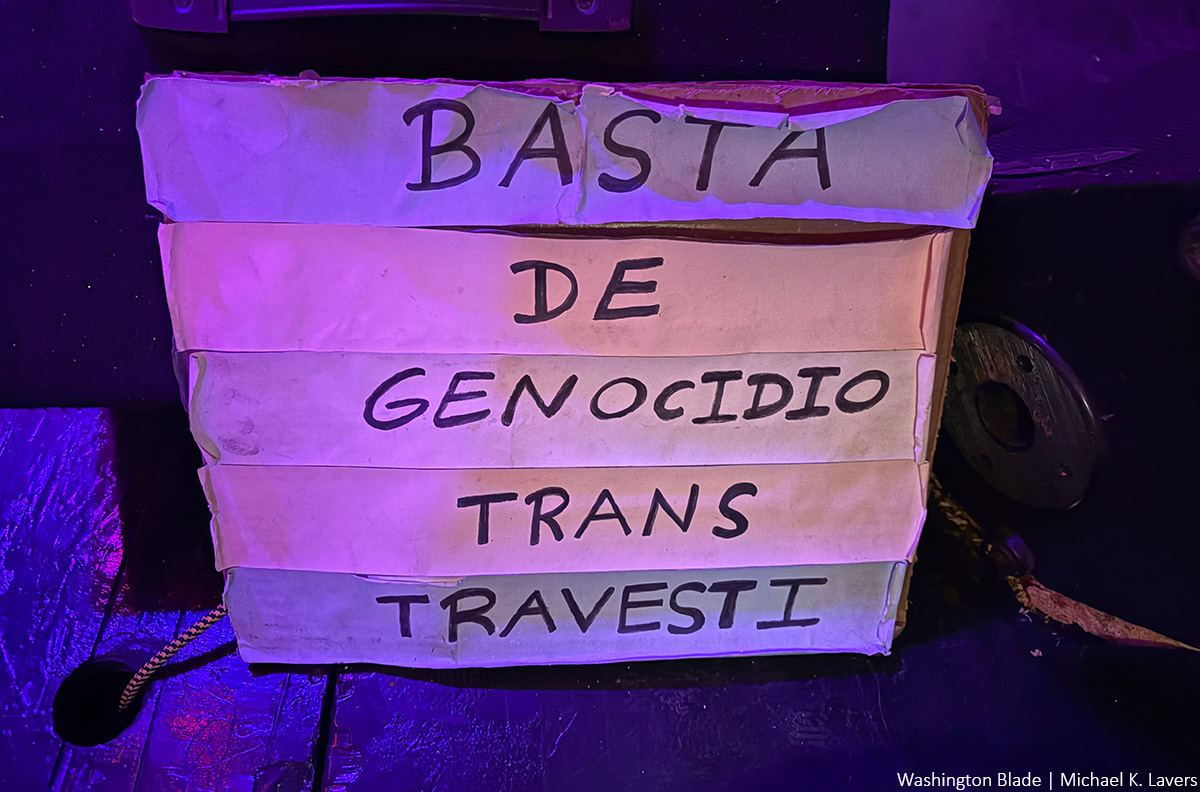
Boetti said she does not think Argentina will once again become a dictatorship under Milei.
“But unfortunately, there is a lot of harassment and a lot of hate speech,” said Boetti.
“There are now laws that protect us, but there is a fight for sure,” added Echenique. “I don’t think we’ll go back to how things were before, and that’s why I again emphasize the importance of archiving memory in this.”
Cuba
Cuban lawmakers to consider simplifying process for trans people to change IDs
National Assembly in July will reportedly debate proposal
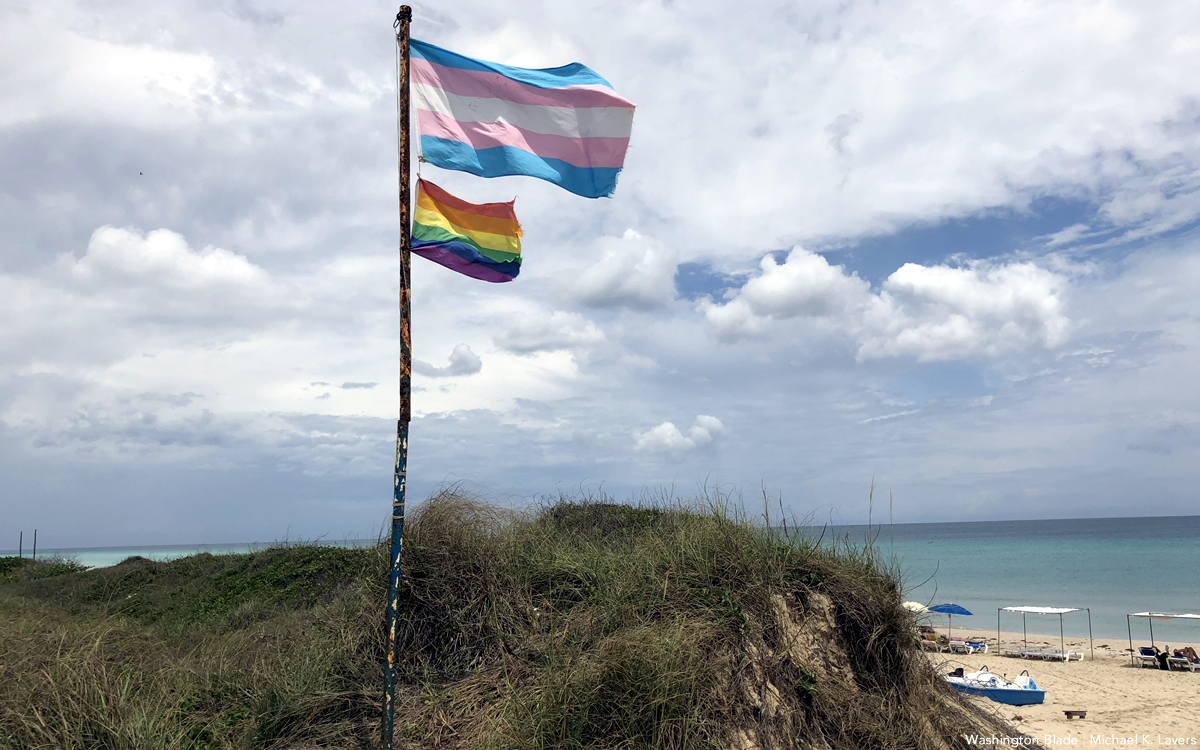
Cuban lawmakers are reportedly poised to consider a proposal that would allow transgender people to legally change the gender marker on their ID documents without surgery.
Cubadebate, a government-run website, on May 11 referenced the proposal in an article about an International Day Against Homophobia, Biphobia, and Transphobia march in Havana that the National Center for Sexual Education organized.
Mariela Castro, the daughter of former Cuban President Raúl Castro who spearheads LGBTQ issues on the island, is CENESEX’s director.
Cubadebate notes the National Assembly in July will consider an amendment to the country’s Civil Registry Law that “for the first time would allow citizens to determine the sex on their identification cards without the need for a court order or gender assignment surgery.”
Argentina, Uruguay, Germany, and Malta are among the countries that allow trans people to legally change their name and gender without surgery.
Cuba’s national health care system has offered free sex-reassignment surgery since 2008, but activists who are critical of Mariela Castro and CENESEX have said access to these procedures is limited. Mariela Castro, who is also a member of the National Assembly, in 2013 voted against a measure to add sexual orientation to Cuba’s labor code because it did not include gender identity.
The Cuban constitution bans discrimination based on sexual orientation and gender identity, among other factors. Authorities routinely harass and detain activists who publicly criticize the government.
Iran
Underground queer network challenges Iranian regime
Homosexuality remains punishable by death in country

While global powers negotiate with Iran’s regime under Ayatollah Ali Khamenei to curb its advancing nuclear program, the oppressed LGBTQ+ community is building and operating a secret underground network to resist state-coerced sex reassignment surgeries.
These surgeries, mandated for gay and lesbian people as a state-sanctioned alternative to execution for homosexuality, are part of Iran’s penal code that criminalizes consensual same-sex sexual relations. The network provides safe houses, forged identification documents, and covert communication channels to protect members from government raids and imprisonment.
Precise data on LGBTQ+ people prosecuted in Iran for resisting state-coerced sex reassignment surgeries over the past decade remains elusive, as the regime’s opaque judicial system obscures such cases under vague charges like “corruption on earth” or “sodomy.” NGOs, including 6Rang, report that thousands of gay and lesbian Iranians face pressure to undergo surgeries to avoid execution for same-sex conduct, with resistance often leading to arrests or harassment for violating gender norms.
Zahra Seddiqi Hamedani and Elham Choubdar, two prominent activists, in 2022 were sentenced to death for their social media advocacy, charged with “corruption” and “human trafficking,” though their convictions were overturned in 2023. Similarly, Rezvaneh Mohammadi in 2019 received a five-year sentence for promoting “homosexual relations,” a charge hinting at resistance to the regime’s heteronormative mandates.
Arsham Parsi in 2003 escalated his clandestine fight for Iran’s LGBTQ+ community by launching Voice Celebration, a secret Yahoo chat group where 50 queer Iranians, using aliases, exchanged coded messages to evade the regime’s surveillance. Operating like operatives in a shadow network, participants shared text messages about human rights and survival tactics, knowing a single breach could lead to torture or execution. Parsi, then 23, orchestrated the group’s encrypted communications, building a virtual lifeline that connected isolated individuals across the country until his cover was nearly blown, forcing a desperate escape in early 2005.
Parsi in an exchange with the Los Angeles Blade revealed a defiant undercurrent in Iran, a movement too elusive to be called traditional resistance yet pulsing with covert rebellion against the regime.
The state’s relentless push to force gay men into coerced surgeries — marketed as a “solution” to their sexuality — seeks to erase their identities through enforced conformity. Parsi, steering the International Railroad for Queer Refugees, disclosed how queer Iranians fight back with clandestine measures: Underground education to counter state propaganda, discreet psychological support to fortify resilience, and encrypted networks to forge secret alliances. These efforts, veiled to evade regime detection, dismantle the state’s narrative with every hidden signal and guarded connection.
“We are working to create a true grassroots resistance by empowering people to understand their identity, seek safe alternatives, and reclaim their agency despite the oppressive context,” said Parsi. “The Iranian regime’s policies are built on denial of sexual orientation and a forced alignment with a binary gender model.”
“Rather than recognizing gay, lesbian, or bisexual individuals, the system pressures them — particularly gay men — to undergo irreversible surgeries in order to be legally tolerated,” he added. “This systemic violence creates deep psychological harm and compels many to resist, even quietly, to protect their truth. The lack of legal recognition and the threat of arrest, harassment, or blackmail fuels the underground defiance we see today. It’s not only resistance for survival — it’s a rejection of state-imposed identity suppression.”
IRQR, guided by Parsi, for nearly two decades has operated as a lifeline, orchestrating daring escapes and running a covert network for Iran’s hunted queer community.
Parsi said his work relies on secret, encrypted channels — meticulously managed to avoid detection — to funnel at-risk individuals to safety, smuggle life-saving information, secure hidden safe houses, and deliver emotional support. Every operation faces threats not only from the regime’s security forces but also from Basij militia operatives who masquerade as queer individuals to infiltrate networks, heightening the peril for those marked by their identities.
Black-clad Basij militia members respond at the first signs of defiance; tearing through crowds on motorcycles with batons and guns at the ready, poised to crush any challenge to Iran’s regime. These paramilitary volunteers, bound by fierce loyalty to the Islamic Republic, serve as the state’s enforcers, their plainclothes operatives slipping into dissident networks to root out the defiant.
The Basij fill queer Iranians with dread; their so-called morality patrols and digital traps stalking those who dare to exist outside the regime’s rigid norms.
“Their goal is not only to gather intelligence but to undermine, divide, and cancel the work of activists and organizations like ours,” said Parsi. “This divide-and-conquer strategy is designed to break solidarity and generate mistrust.”
“We have seen numerous cases where trusted circles were compromised by these informants, and it has made our work — and survival — even more complex,” he further noted. “Despite this, we persist. Through our underground connections, we have helped thousands of queer Iranians seek safety, community, and ultimately, freedom.”
Parsi told the Blade that international support — through funding, advocacy, policy pressure, or amplifying his stories — can significantly strengthen his work to protect Iran’s persecuted queer community. He emphasized IRQR operates with limited resources, making global solidarity essential to improve outreach, enhance safety measures, and respond swiftly to those in need. Parsi underscored such support brings visibility to the crisis in Iran, reminding those at risk they are not forgotten while exerting pressure on a regime that thrives on silence and fear.
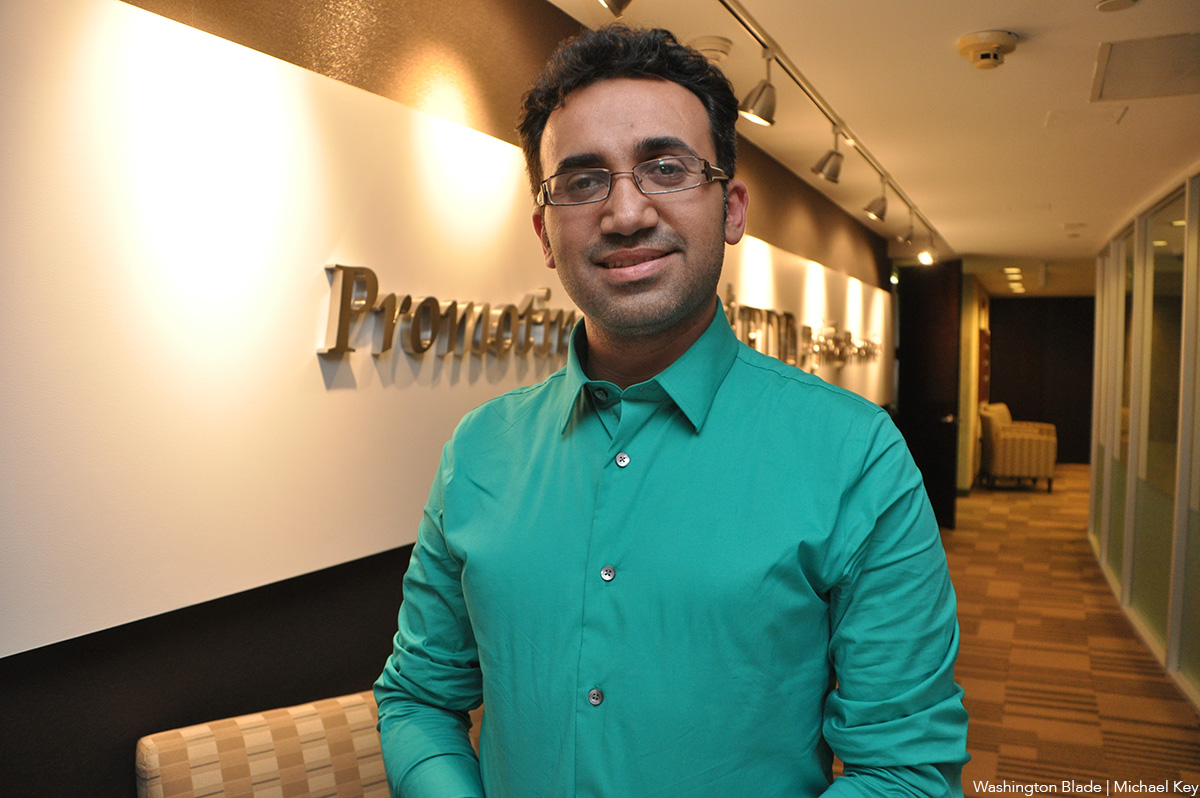
One of the things that Parsi’s underground network offers is online workshops that educate queer Iranians about how they can remain beyond the regime’s reach.
He said these sessions, designed for safety and accessibility, encompass peer support, mental health education, digital security training, and guidance on refugee pathways. Parsi explained the workshops give vulnerable Iranians the tools to navigate persecution, defy state surveillance, and pursue escape, exposing the resilience of a community under relentless scrutiny.
“Due to the high risk of persecution in Iran, traditional protests are not feasible,” said Parsi. “Instead, acts of resistance take quieter forms — like anonymous storytelling which are just as powerful in building awareness and connection within the community. While discreet, these activities help create a sense of solidarity and empowerment among queer Iranians.”
Parsi, undeterred by Iran’s unyielding regime, asserted with measured confidence that while underground acts of defiance — living authentically, supporting one another, resisting forced medicalisation — may not shift policy overnight, they are already improving lives. He stressed these quiet rebellions that queer Iranians stage challenge the regime’s narrative of shame and invisibility, forging a resilient foundation for future change. Each act, Parsi emphasized, dismantles the regime’s grip, offering hope to those navigating a landscape of relentless oppression.
“At IRQR, we view each life saved, each network built, and each truth spoken as a small but powerful act of resistance,” said Parsi. “These are the seeds of future liberation. Over time, as they multiply and gain visibility — locally and internationally — they will help reshape the landscape for queer Iranians.”
ILGA Asia Executive Director Henry Koh said queer Iranians’ underground resistance is a powerful assertion of bodily autonomy and self-determination. He described it as a deeply courageous act in a regime where visibility invites immense personal risk, from arrest to execution.
When asked by the Blade if the Iranian regime’s punitive measures against openly queer people fuel underground resistance, Koh responded unequivocally.
“Absolutely,” he said. “The climate of criminalization and repression leaves little safe space for queer people to live openly. This forces many into secrecy or underground networks as a means of survival, resistance, and mutual support. Such conditions are not only unjust but also profoundly harmful to the well-being of LGBTIQ+ individuals.”
“It is important to distinguish between affirming gender-affirming care and any form of coercive medical intervention,” he added. “When states or authorities mandate medical procedures as a condition for recognition or safety, it constitutes a grave violation of human rights. Gender identity is deeply personal, and no institution should override an individual’s self-defined identity.”
Chile
Chilean lawmakers back report that calls for suspension of program for trans children
Country’s first transgender congresswoman condemned May 15 vote
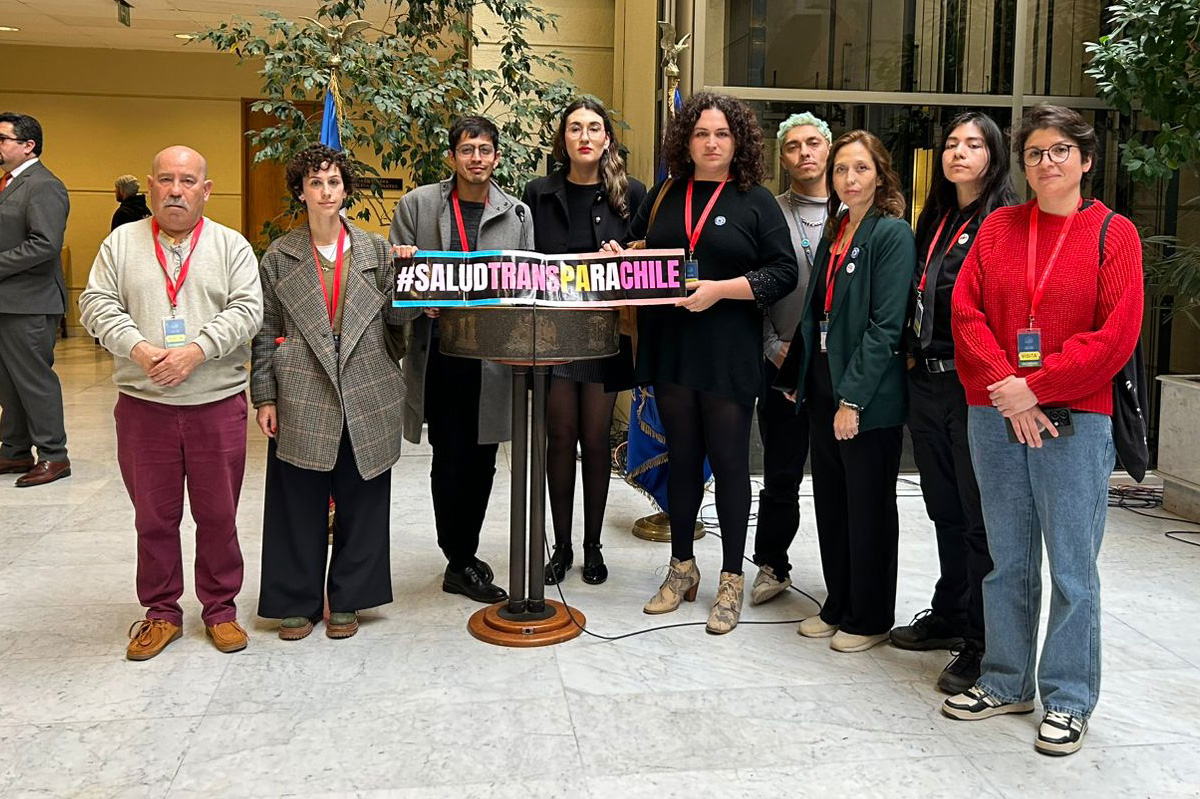
The Chilean Chamber of Deputies on May 15 approved a report that recommends the immediate suspension of a program that provides psychosocial support to transgender and gender non-conforming children and adolescents and their parents.
The 56-31 vote in favor of the Investigation Commission No. 57’s recommendations for the Gender Identity Support Program sparked outrage among activists in Chile and around the world. Six lawmakers abstained.
The report proposes the Health Ministry issue a resolution against puberty blockers, cross-hormonalization, and other hormonal treatments for minors, regardless of whether they have been diagnosed with gender dysphoria. The report also suggests Chilean educational institutions should not respect trans students’ chosen names.
The report, among other recommendations, calls for a review of the background of all minors who are currently receiving hormone treatments. The report also calls for the reformulation of hormone therapy guidelines and sending this background information to the comptroller general.
Report ‘sets an ominous precedent’
Frente Amplio Congresswoman Emilia Schneider, the first trans woman elected to the Chilean Congress and a member of the commission, sharply criticized her colleagues who voted for the report.
“Today in the Chamber of Deputies the report of hatred against trans people was approved; a report that seeks to roll back programs so relevant for children, for youth, such as the Gender Identity Support Program; a program that, in addition, comes from the government of (the late-President) Sebastián Piñera,” Schneider told the Los Angeles Blade. ”This is unacceptable because the right-wing yields to the pressures of the ultra-right and leaves the trans community in a very complex position.”
Schneider noted “this report is not binding; that is, its recommendations do not necessarily have to be taken into account, but it sets an ominous precedent.”
“We are going backwards on such basic issues as the recognition of the social name of trans students in educational establishments,” she said.
Ignacia Oyarzún, president of Organizing Trans Diversities, a Chilean trans rights group, echoed Schneider’s criticisms. commented to the Blade.
“We regret today’s shameful action in the Chamber of Deputies, where the CEI-57 report issued by the Republican Party was approved in a context of lies, misinformation and misrepresentation of reality,” Oyarzún told the Blade. “This only promotes the regression of public policies and conquered rights that have managed to save the lives of thousands of children in the last time.”
Oyarzún added the “slogan ‘children first’ proves to be an empty phrase without content used by those who today promote measures that push to suicide a significant number of children for the fact of being trans.”
The Movement for Homosexual Integration and Liberation, a Chilean LGBTQ+ rights group known by the acronym Movilh also condemned the approval of the report, calling it “transphobic” and accusing the commission of omitting the opinions of organizations and families that support the current policies.
Movilh notes lawmakers approved both the Gender Identity Law and Circular 812, which promotes respect for trans students’ rights, within the framework of an agreement with the Inter-American Commission on Human Rights.
“The text of the approved report is scandalous, because it seeks to take away the access to health to trans minors, including denying them the psychosocial accompaniment that also includes their respective families,” said María José Cumplido, executive director of Fundación Iguales, another Chilean LGBTQ+ advocacy group. “Likewise, it attempts against school inclusion, since it intends to eliminate something as essential as the use of the social name in educational spaces. In short, it takes away rights and freedoms to trans people, especially to minors.”
Cumplido, like Schneider, pointed out that “although its content is not binding, we will be alert to the political and legislative consequences that it may produce and we will continue working to avoid setbacks with respect to the rights of trans people.”
The report’s approval reflects a global trend that has seen neighboring Argentina, the U.S., and other countries reserve policies for trans and nonbinary young people. The Peruvian Health Ministry recently classified gender identity as a mental illness, and lawmakers have passed a law that prevents trans people from using public restrooms based on their identity.

photo by Michael K. Lavers)
Experts and human rights activists warn the suspension of Chile’s Gender Identity Support Program and other programs could adversely impact the mental health of trans and nonbinary children who already face high levels of discrimination and are at heightened risk to die by suicide.
“We will defend the Gender Identity Support Program and the right to exist of trans children and youth across the country,” said Schneider. “I want to reassure the trans families of our country that we will not rest until our rights are respected and that we can continue advancing because there is still much to be conquered.”
El Salvador
El Salvador conmemora el 17M bajo un clima de miedo y retroceso en derechos LGBTQ+
Activistas denunciaron al gobierno de Nayib Bukele
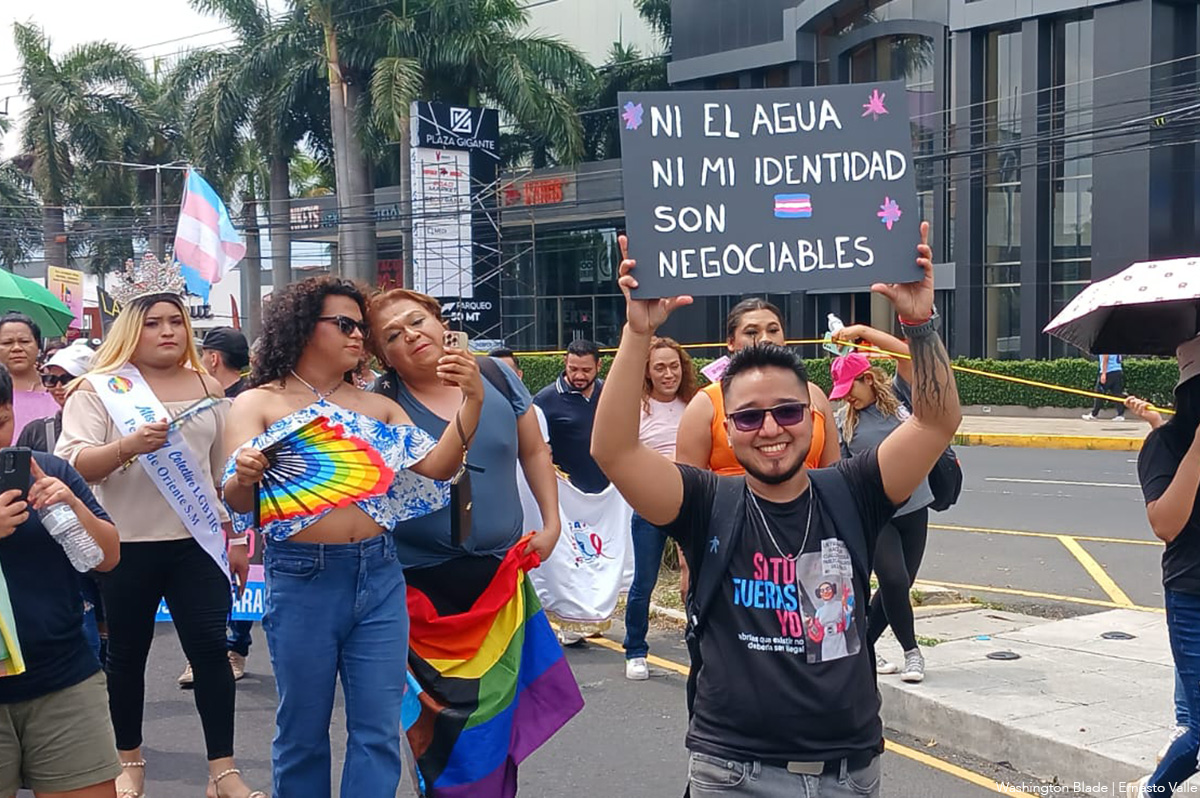
El 17 de mayo se conmemora a nivel mundial el Día Internacional contra la Homofobia, Transfobia y Bifobia, recordando la eliminación de la homosexualidad como enfermedad mental por parte de la Organización Mundial de la Salud en 1990. Sin embargo, esta fecha también se ha convertido en un espacio de denuncia ante la violencia estructural e institucional que sigue afectando a la población LGBTQ+ en muchos países, incluido El Salvador.
Este año, la marcha conmemorativa del 17 de mayo en San Salvador fue más reducida que en ocasiones anteriores. Decenas de personas se reunieron para alzar su voz a pesar del temor creciente entre quienes integran la diversidad sexual y de género.
Las amenazas no son nuevas, pero sí más frecuentes en el contexto actual.
Activistas, colectivas y organizaciones de derechos humanos denuncian que el gobierno de Nayib Bukele ha profundizado un discurso y una práctica anti-derechos. Para muchas de estas personas, la visibilidad se ha vuelto sinónimo de riesgo.
Desde la Asociación ASPIDH, Valeria Mejía, coordinadora de monitoreo y evaluación, expresó que “a inicios de 2025, el presidente Nayib Bukele y su gobierno oficializaron una postura anti-derechos, profundizando las amenazas estructurales contra los derechos humanos en El Salvador”. Alegan que esto ha generado retrocesos concretos para la comunidad LGBTQ+.
Mónica Hernández, directora ejecutiva de ASPIDH, ha sido enfática en sus declaraciones.
“Se está silenciando a las organizaciones defensoras de derechos humanos a través de amenazas o restricciones legales”, afirmó. Y exigió al gobierno restituir los mecanismos que protegían a la población diversa.
Una de las luchas históricas aún sin respuesta es la aprobación de una ley de identidad de género. Actualmente, las personas trans no pueden modificar su nombre y género en sus documentos legales, lo que las expone a tratos humillantes en hospitales, centros educativos, juzgados y otras instituciones públicas.
La falta de una legislación que apoye a las personas trans sobre su identidad de género sigue siendo una afectación, por lo que sufren discriminación institucionalizada, en hospitales, centros educativos, juzgados, entre otros, donde suelen enfrentar trato discriminatorio o negación de servicios por no coincidir su identidad de género con sus documentos legales, mencionó una vocera de la Mesa por Una Ley de Identidad.
En la marcha de este año, las calles no se llenaron como en otras ocasiones. El miedo a la criminalización fue evidente.
“Los agentes del CAM me dijeron que con este régimen me podían acusar de ser pandillera solo por ser trans y andar tatuada”, declaró una participante, temblorosa, al Los Angeles Blade.
A pesar del temor, hubo presencia. Algunas organizaciones de base y colectivos de clase trabajadora mostraron su solidaridad. Entre ellas, el Movimiento por la Defensa de los Derechos Humanos de la Clase Trabajadora, quienes acompañan el caso de Carolina Escobar, una mujer trans despedida injustamente del ISDEMU.
Escobar también estuvo en la marcha.
“Hay que permanecer unidas las minorías, yo estoy acá a pesar de que he sufrido persecución por parte de la Policía Nacional Civil, por dar seguimiento a los casos de despidos injustificados del ISDEMU”, comentó.
La analista política y activista Bessy Ríos de la organización De La Mano Contigo no se mostró optimista con el panorama.
“Hay que prepararse para el peor de los escenarios y crear redes de apoyo entre nosotros”, recalcó durante la jornada conmemorativa.
La colectiva feminista también acompañó la marcha y compartió con otros colectivos mensajes de unidad.
“En tiempos difíciles, es cuando debemos unirnos más”, dijo una joven activista con una pañoleta verde en su rostro.
La represión no solo se percibe en las calles. Desde hace meses, muchas organizaciones LGBTQ+ han denunciado bloqueos al financiamiento internacional que sostenía proyectos de apoyo, atención psicológica y asesoría legal. Sin esos fondos, la lucha se vuelve más cuesta arriba.
Además, la anunciada Ley de Agentes Extranjeros —todavía en discusión— amenaza con imponer un impuesto del 30 por ciento a las donaciones provenientes del extranjero. Esto pondría en jaque a decenas de ONG que trabajan directamente con poblaciones vulnerables, incluida la diversidad sexual.
La consigna en esta fecha ha sido clara: la lucha no se detiene. Incluso con menos recursos y bajo amenazas, quienes se organizaron para conmemorar el 17 de mayo lo hicieron con la firme convicción de que los derechos humanos no se negocian.
Desde las pancartas hasta las intervenciones públicas, el mensaje fue contundente: el Estado salvadoreño debe cesar toda forma de discriminación hacia las personas LGBTQ+ y garantizar políticas inclusivas que aseguren su acceso a la salud, la educación, la justicia y el empleo.
En cada paso, se entretejía el recuerdo de quienes ya no están, y el deseo ferviente de un futuro distinto.
“Marchamos por quienes no pudieron llegar hoy, por quienes tienen miedo, por quienes ya no están. Seguiremos exigiendo respeto y dignidad”, expresó una activista.
Peru
Peruvian activists react to Pope Leo XIV’s election
American-born pontiff was bishop of Chiclayo
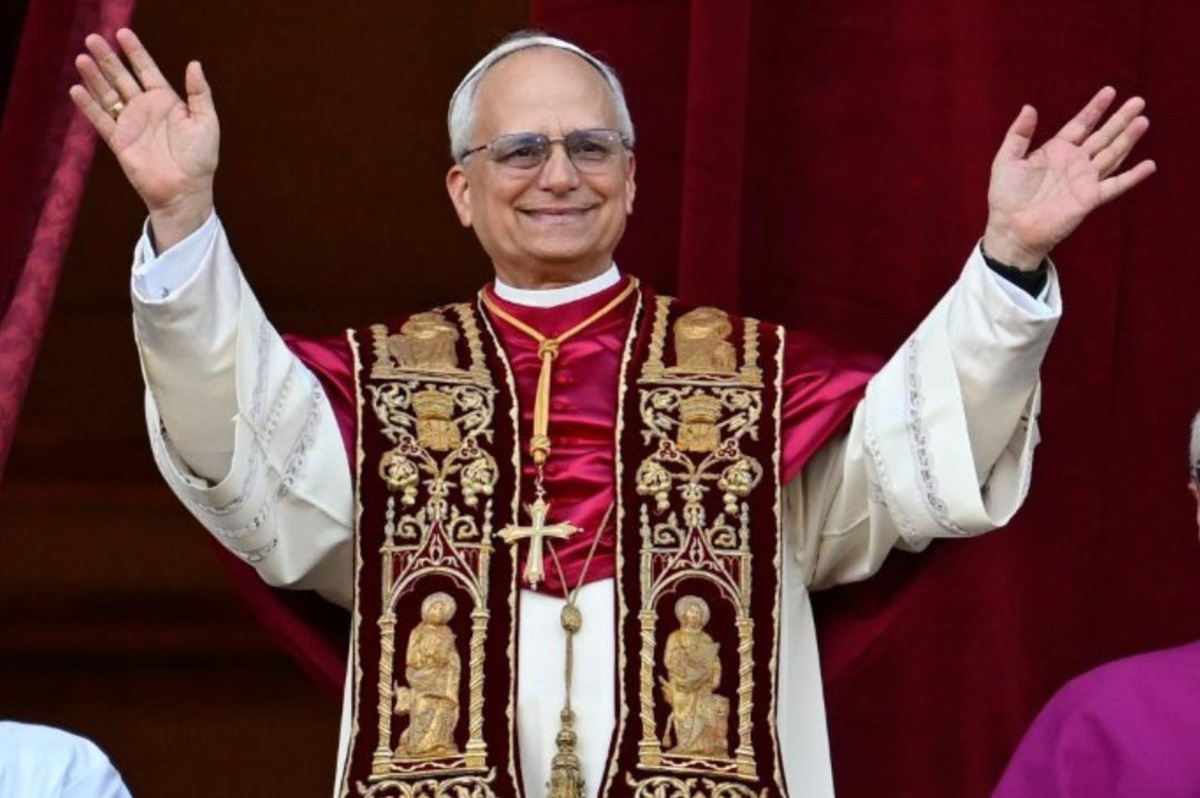
Pope Leo XIV’s election has sparked global reactions, but his appointment has struck a deeper chord in Peru.
The now-pontiff served for years as bishop of Chiclayo, a city in northern Peru. For LGBTQ+ leaders and activists in the country, Leo represents a figure who, while unlikely to overhaul church doctrine, could signal a shift towards a less hostile and more open Catholic Church.
“The fact that the new pope lived and served pastorally in Peru is no small thing,” said George Hale, director of Promsex, an advocacy group that is based in Lima, the Peruvian capital. “Leo XIV is deeply familiar with inequality, abuses of power, popular religiosity, and the pain of a society scarred by classism and exclusion. His support for victims of the Sodalitium scandal showed a courageous figure willing to listen when others remained silent.”
The Sodalitium of Christian Life, a Peruvian Catholic lay group implicated in cases of sexual and psychological abuse against minors, became one of the church’s worst scandals in Latin America. Leo’s direct involvement in sanctioning those responsible — and his central role in the group’s eventual dissolution — was widely viewed as a sign of his commitment to reform from within.
Former Congressman Alberto de Belaunde, one of Peru’s few openly gay political figures, also welcomed Leo’s election, describing his trajectory as “good news within the Vatican.” De Belaunde emphasized Leo’s time at the Pontifical Catholic University of Peru, where he served on the university’s assembly as the church’s representative.
“Unlike other pontifical universities, the PUCP is progressive and diverse,” De Belaunde said. “Monsignor Prevost always demonstrated a remarkable ability to dialogue and showed respect for differing views. That speaks volumes about both his intellectual and pastoral approach.”
The question still remains: How much could the church change under Leo’s papacy when it comes to LGBTQ+ rights?
“Sometimes, even just a change in tone makes a difference,” De Belaunde noted. “I grew up under the influence of Pope John Paul II and Bishop Cipriani, both known for confrontational rhetoric. When the pope says things like ‘Who am I to judge?’ — it doesn’t change doctrine, but it humanizes the discourse. And that matters.”
De Belaunde specifically referred to Pope Francis’s 2013 comments about gay priests. (The Vatican’s tone on LGBTQ+ and intersex issues softened under Francis’s papacy, even though church teachings on homosexuality did not change.)
“There are very conservative factions within the church, outright enemies of our rights,” said Congresswoman Susel Paredes, who is a lesbian. “But there’s also space for love of neighbor, as Jesus taught. Even if Pope Leo XIV were to chart a path toward full inclusion of LGBTQ people, resistance would remain. These things don’t change overnight.”
Paredes also highlighted Francis’s legacy — especially his vision of a synodal church. The Argentine-born pontiff who died on April 21 was Leo’s direct mentor.
“Pope Francis spoke of a church where ‘everyone, everyone, everyone’ walks together without distinction,” she said. “Leo XIV was already part of that vision when he worked in some of Peru’s poorest areas. That gives us hope and reason to watch his papacy with expectation.”
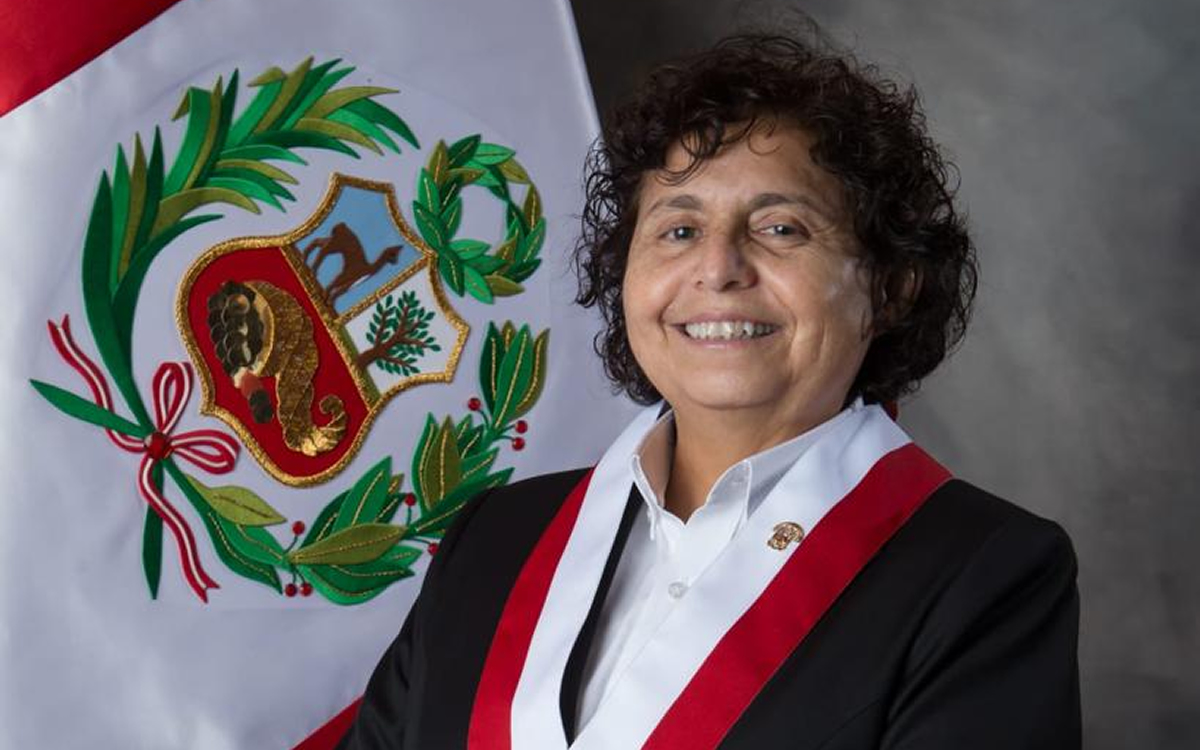
Activists, however, are clear-eyed about the limits of symbolic change.
“He (Leo) doesn’t appear to be a hostile figure,” Hale said. “But he’s not pushing for radical reform either. He won’t lead the fight for same-sex marriage or trans rights. But his more humane tone — his closeness to those on the margins — can help de-escalate hate speech, especially in a country like ours.”
Hale also pointed to a recent gesture from the new Leo that raised concerns: His public support for the Peruvian bishops’ statement opposing a court ruling that granted Ana Estrada, a woman with a degenerative disease, the right to die with dignity through euthanasia.
“By endorsing that statement, he reaffirmed official doctrine. And while he may be compassionate, he’s still aligned with traditional positions on some key issues,” Hale said. “That’s why we insist: We’re not expecting a revolution, but a shift in tone matters.”
Peru does not recognize same-sex marriages, and transgender people lack legal protections. Expectations about Leo’s papacy remain measured because church rhetoric remains a roadblock to civil rights.
“Rights are granted by laws, and the separation of church and state must remain fundamental,” said Paredes. “That’s where progress happens, in secular legislation.”
“Yes — it’s a breath of fresh air to have a pope who doesn’t slam the door shut, who has walked with Peru’s most excluded,” she added. “That gives us encouragement to keep going.”
Uruguay
Former Uruguayan president José Mujica dies at 89
One-time guerrilla fighter signed marriage equality law in 2012
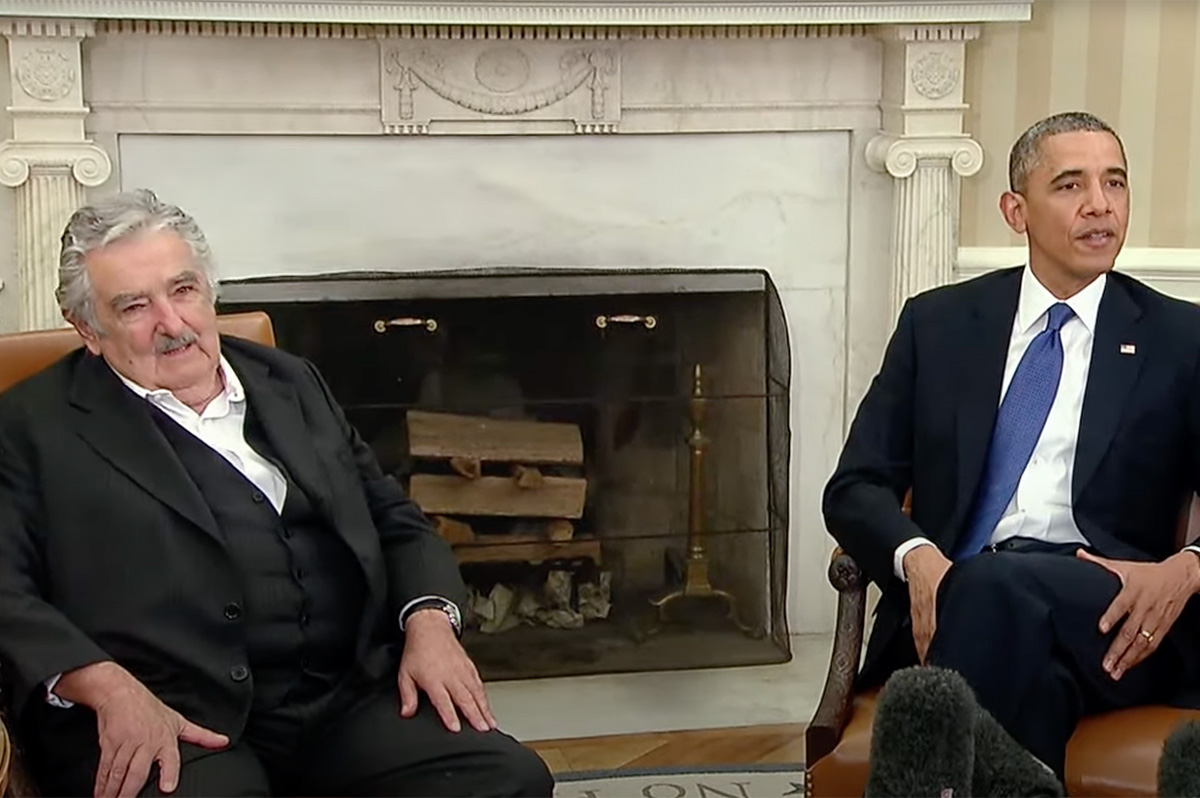
Former Uruguayan President José “Pepe” Mujica died on Tuesday. He was 89.
Mujica, a farmer, was a member of Tupamaros National Liberation Movement, a leftist guerrilla group that carried out bank robberies and bombings and kidnapped politicians and businessmen in the South American country during the 1960s and 1970s.
Mujica spent nearly 15 years in prison. The right-wing military dictatorship that governed Uruguay from 1973-1985 tortured him and held him in solitary confinement for a decade.
Mujica in 1989 joined the Movement of Popular Participation, a party that is part of the Broad Front, a leftist political coalition. Mujica was Uruguay’s president from 2010-2015.
Laws that extended marriage rights to same-sex couples and legalized abortion took effect in 2013 and 2012 respectively. Mujica in 2013 also signed a law that legalized recreational marijuana in Uruguay.
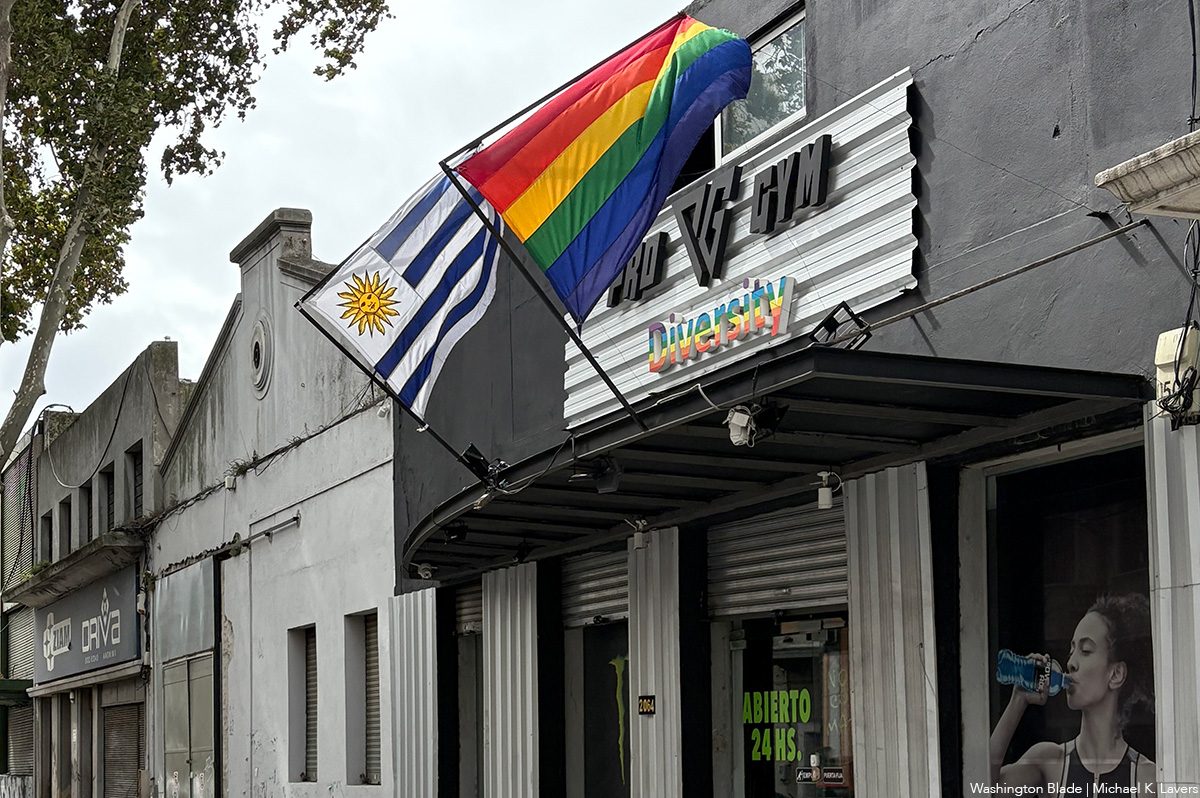
Mujica earlier this year announced he would not undergo further treatment for esophagus cancer that had spread to his liver. The AP notes he died in his small house outside of Montevideo, the Uruguayan capital.
“With profound pain we announced that our friend Pepe Mujica has died,” said Uruguayan President Yamandú Orsi, who currently leads the Broad Front, on X. “President, activist, guide, and leader. We are going to miss you very much, dear old man. Thank you for everything that you gave us and for your profound love for your people.”
Esteban Paulón, a gay congressman in neighboring Argentina, celebrated Mujica as a “guide” for “Latin American progressivism.”
“He made humility, honesty and austerity his hallmarks,” said Paulón on social media.
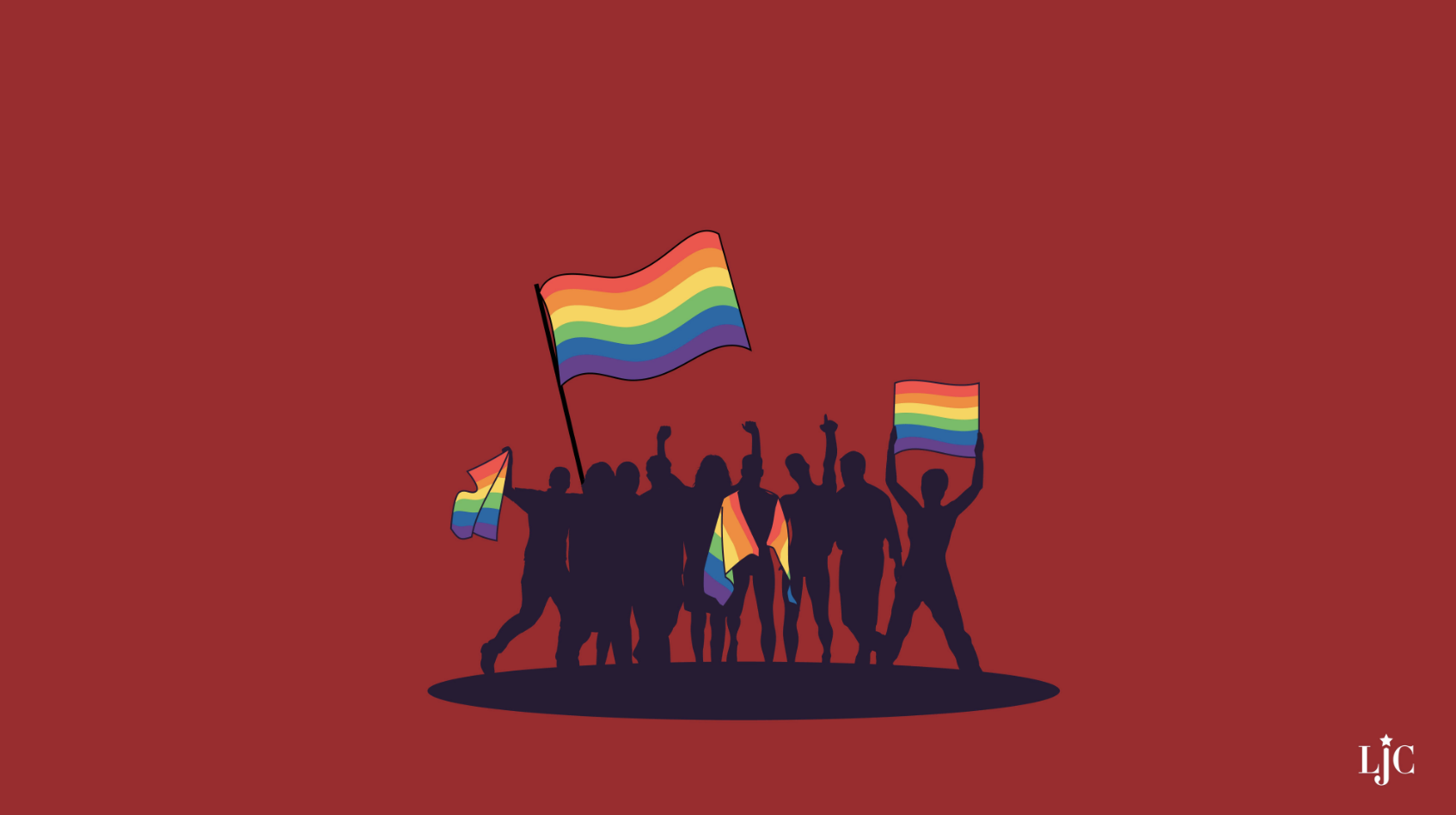
La Joven Cuba se publicó esta nota en su sitio web el 12 de mayo
Por NORGE ESPINOSA MENDOZA | En el calendario cubano, mayo es un mes cargado de fechas singulares y múltiples celebraciones. Desde su primer día, marcado por el tradicional desfile que recuerda a los mártires de Chicago como tributo a los trabajadores del mundo, pasando por el Día de las Madres, el Día Internacional de los Museos y el Día de África, entre muchas otras fechas. Se trata de una agenda cargada de memorias, consignas, festejos públicos o más domésticos que se concentran en esas cinco semanas.
La incorporación a todo ello del reconocimiento en nuestro país del 17 de mayo como Día Internacional contra la Homofobia, la Transfobia y la Bifobia removió ese panorama, sobre todo porque se trata de la misma fecha en la que se celebra el Día del Campesino y la Reforma Agraria. Entre las diversas reacciones que desencadenó todo ello, sirva como ejemplo del estupor con el que parte de la población cubana reaccionó, este fragmento de las décimas humorísticas creadas por Ángel Rámiz, muy popular gracias a su personaje El Cabo Pantera:
«Que esto no es chisme ni brete
y me da genio, compay,
¡con tantos días que hay
escoger el 17!
Quiero que se me respete,
se me dé una explicación:
¿Ese día mis amistades
me dicen felicidades
por guajiro o maricón?»
La elección de ese día molestó, irritó, generó controversias, en las cuales algunos rememoraron que para el calendario nacional ese día fue distinguido en favor del campesinado por conmemorarse en tal fecha el asesinato de Niceto Pérez, en 1946. La supuesta contradicción entre la imagen del campesino viril, líder y símbolo del trabajador agrícola, fue un detonante que no hallaba justificación ni siquiera en el hecho de que se trataba de resaltar desde nuestro país algo fijado internacionalmente por la Organización Mundial de la Salud.
Como señala la nota que presenta en el Decimerón esos versos de Ángel Rámiz, no faltó quien rebautizara al 17 de mayo, en tono despectivo pero también desde los límites de nuestro incontenible choteo, como Día del Maricón. Y más allá de esa anécdota, hacer memoria sobre este asunto nos permite recalibrar las tensiones que, entre consignas, mitos, épica y sexualidad, han marcado la aparición, visibilidad o invisibilidad de las llamadas minorías que también componen el entramado social del país, así sea al borde o en los márgenes de la historia oficial.
En esos territorios opacos, borrosos, ambiguos, a los que solo en fechas recientes se ha empezado a mirar y estudiar sin los prejuicios que sigue padeciendo la mirada de regla y cartabón de la narrativa oficial, aún perduran incomodidades, interrogantes y tabúes, que cada vez que nos acercamos al 17 de mayo resucitan o recobran interés en las agendas y los debates acerca de política, historia, sexualidad y cuerpo nacional. Un cuerpo que ha aprendido a saberse diverso, no solo porque desde esas agendas se le brinde tal posibilidad, sino porque las condiciones extremas a las que ha sobrevivido le han permitido hallar sus propias armas y herramientas para tal hazaña.
La memoria de los cuerpos disidentes
La historia de los cuerpos sexuados ha ido emergiendo lentamente ante nosotros, gracias al empeño de investigadores, historiadores, activistas, artistas, y finalmente, gracias a la irrupción de esas voluntades y biografías en los espacios gubernamentales donde por años se pensó únicamente desde el prisma heteronormativo y patriarcal, que también fue abrazado por la Revolución.
Las normativas y la preocupación por el deslinde de esos cuerpos, por las prácticas no re/productivas ni de ganancia inmediata para la nueva causa, estallaron desde el inicio. Es el elemento que dispara sus dardos lo mismo contra los cuerpos negros y mulatos que se divierten la madrugada del puerto habanero durante los pocos minutos del documental PM (cuya censura en 1961 provocó las Palabras a los intelectuales), que contra los pasajes eróticos de El mundo alucinante, la novela que presentó Reinaldo Arenas al concurso de la UNEAC en 1967, y que no solo no ganó al premio, sino que aún no ha sido publicada en Cuba. Ese recelo también fue el que activó las redadas en la Rampa habanera, la Noche de las Tres P en 1961, o las expulsiones de las universidades y escuelas de arte de aquellos que vivían una sexualidad disidente en la misma década.
El I Congreso de Educación y Cultura formalizó ese rechazo, en 1971, y aseguró durante los años 70 un periodo de oscurecimiento y pobreza en numerosos espacios de la vida nacional durante el decenio. Esos recelos volvieron a aflorar durante los días del Mariel y la Embajada de Perú: declararse lesbiana u homosexual (el término gay no era frecuente en el habla cubana de esos días aún) era una especie de salvoconducto inmediato para quienes querían abandonar el país rumbo a los Estados Unidos, a pesar de la amenaza de golpiza, o tener que avanzar a través de una muchedumbre que gritaba ofensas homofóbicas con la misma intensidad con la que lanzaba huevos podridos contra esos «desafectos». La memoria tarda en sanar. La memoria del cuerpo también tiene su propio canal de biografías.
La memoria tarda en sanar. La memoria del cuerpo también tiene su propio canal de biografías.
Esas memorias han demorado en añadirse a la narrativa que repasa esos acontecimientos. Los libros y testimonios que en su mayoría dan fe de esos rechazos y traumas comenzaron a aparecer fuera de Cuba, ya en los 80, y la llegada de la generación de los marielitos a Estados Unidos de América abrió una brecha de información que dio pie a volúmenes y documentales (Improper Conduct, de 1984, sigue siendo el más famoso y debatido), y que desde nuestro aparato partidista se leyó o denunció como una maniobra difamatoria contra la Revolución.
Ha sido un proceso arduo, doloroso, en el que las zonas de apertura o la desaparición de leyes que criminalizaban la homosexualidad y la existencia de «seres extravagantes», fluctuaba entre períodos de flexibilidad intermitentes y la insistencia en recordar que el cuerpo revolucionario de ese Hombre Nuevo imaginado por Ernesto Ché Guevara era, sobre todo, un cuerpo impenetrable.
De la marginación al «activismo oficial»
A fines de esa década, en el albor mismo de los años 90, una nueva generación de artistas había empezado a quebrar esas nociones tan rígidas, y mediante el quehacer de poetas, narradores, teatristas y figuras de la plástica, el valor de lo ambiguo, de la duda, de la necesidad de saltar sobre vetos y censuras, así como la posibilidad de que los cuerpos fueran celebrados más allá de las campañas de la zafra, las misiones internacionalistas, y otras imágenes aprobadas por el discurso oficial, consiguió hacer más respirable al país para aquellas personas que habían tenido que reprimir palabras y gestos a fin de evitar la estigmatización que, en no pocos casos, incluía el no poder optar por determinadas carreras universitarias o puestos de trabajo.
En 1989 se crea, precisamente, el Centro Nacional de Educación Sexual (CENESEX), derivado del Grupo Nacional de Trabajo de Educación Sexual, fundado a instancias de la Federación de Mujeres Cubanas, en 1974. Durante esos últimos años de la década, el rostro del doctor Celestino Lajonchere y de la doctora alemana Monika Krause se habían ido abriendo paso en programas televisivos y en otros medios, como principales voceros de la campaña de educación sexual que en sus primeros momentos estaba más enfocada en la instrucción acerca del uso de métodos anticonceptivos o la prevención del embarazo en edad adolescente, hasta llegar al gran tema tabú que era el homosexualismo.
La publicación de libros como En defensa del amor y ¿Piensas ya en el amor? convirtieron a esos títulos en best-sellers, confirmando la necesidad de una variante menos anticuada, pacata y moralizante de la sexualidad, que vino acompañada por otros materiales y películas (como Siete pecas, el filme de Hermann Zschoche sobre el amor juvenil que incluía una feliz escena de desnudos de la pareja protagónica, producido en la República Democrática Alemana en 1978) que apuntaban a un relajamiento y mejor comprensión de estos asuntos en nuestra cotidianidad. Los años 90 fueron de dureza inimaginada hasta entonces, tras la caída del Socialismo del Este. En ese nuevo ámbito de carencias, Cuba se tuvo que reinventar. Y sus cuerpos también lo hicieron.
Los años 90 fueron de dureza inimaginada hasta entonces, tras la caída del Socialismo del Este. En ese nuevo ámbito de carencias, Cuba se tuvo que reinventar.
En mayo de 2008, el CENESEX sale definitivamente del clóset. La institución, ya bajo la dirección de Mariela Castro Espín, lanza ese año su segunda celebración del Día Internacional contra la Homofobia, la Transfobia y la Bifobia, con una campaña de alcance nacional que va más allá de los muros de su sede en el Vedado, e inunda la Rampa y el Pabellón Cuba en un acontecimiento sin precedentes.
Las reacciones fueron también diversas y apasionadas, incluidas esas que pensaron que se le arrebataba al campesinado su fecha más importante. Pero se comenzó ahí a naturalizar un concepto que sin dudas relocalizó al homosexual, a la lesbiana, a las personas trans, a los pacientes de VIH/Sida y a todo ese conjunto de cuerpos diversos en el imaginario nacional.
Lo que habían logrado poco a poco los artistas y creadores, desde los primero cuentos y poemas sobre el asunto y luego Senel Paz con «El lobo, el bosque y el hombre nuevo» y su versión cinematográfica: Fresa y chocolate, hasta los atrevimientos de Ramón Silverio y su Centro Cultural El Mejunje (en Santa Clara), obtenía otro nivel de legitimidad otorgado por el peso político del linaje de la directora del CENESEX, y el apoyo logrado por ella de diversas entidades e instituciones para gestar lo que en aquel 17 de mayo apareció en los titulares no solo de Cuba, sino en numerosas partes del mundo.
De ese paso de avance, podía esperarse más. Y en cierta medida, con discusiones, aperturas, tibiezas y desafíos, eso fue lo que la comunidad cubana LGBTIQ del país vivió, dentro y fuera de los márgenes del CENESEX, hasta mayo de 2019, cuando lo conseguido y lo aún por lograr se estremeció, se detuvo, y desde mi perspectiva, no ha logrado conciliar sus extremos tras lo ocurrido aquel 11 de mayo.
Los silencios del presente
A seis años de aquella marcha convocada por los activistas LGBTIQ de Cuba como respuesta a la suspensión de la Conga por la Diversidad —versión reducida del Gay Pride que el CENESEX desde el 2008 había implantado como un pequeño desfile a lo largo de varias cuadras de la Rampa— estoy leyendo el libro que el investigador y activista puertorriqueño Wilfred Labiosa publicó en 2024 bajo el título La Revolución LGBT en Cuba, aparecido por el sello Deletrea en Estados Unidos de América.
Ese día, el 11 de mayo de 2019, no existe en tal volumen, a pesar de que su autor reconoce en su epílogo que lo culminó «sentado junto a la ventana de uno de los nuevos hoteles de La Habana», en mayo de 2022. En el prólogo, firmado por Camilo García López-Trigo y Alberto Roque, ligados en un determinado momento al CENESEX, tampoco puede localizarse esa fecha.
Pareciera que, como afirmé hace un par de años, ese día nunca existió, a la manera en que Dulce María Loynaz hablaba de otra fecha en uno de sus poemas. Pero sí existió, sucedió. Y curiosamente, la ausencia en un libro como este, que se supone una guía para quien quiera conocer el devenir de las personas LGBTIQ en la historia de Cuba, lo hace mucho más visible.
Pareciera que, como afirmé hace un par de años, ese día nunca existió, a la manera en que Dulce María Loynaz hablaba de otra fecha en uno de sus poemas.
El volumen de Labiosa, quien ha visitado nuestro país con el auspicio y beneplácito del CENESEX, es su carta de agradecimiento a esta institución. Desde la propia narrativa de blanqueamiento a conveniencia de ciertos aspectos de esa línea histórica que pretende abordar, anula la existencia de libros previos e investigaciones que lo preceden para evitar enumerar conflictos y tensiones que sí han evidenciado otros estudios sobre el tema como los realizados por Víctor Fowler, Jesús J. Barquet, Alberto Abreu, Jesús Jambrina, Francisco Morán, Yoandy Cabrera, Mabel Cuesta, y otros investigadores como José Quiroga, Carlos Espinosa, Rubén Ríos Ávila o Daniel Balderston.
El título se trata de una elección cuidadosa y suspicaz que elimina referentes, se ahorra citar ciertos autores y anécdotas, y así como se extiende en tratar de explicar qué fueron las Unidades Militares de Ayuda a la Producción, adelantándole al CENESEX la investigación prometida sobre esos campos de trabajo forzado en los que fueron recluidos entre 1965 y 1968 homosexuales, disidentes políticos y religiosos.
Lo esbozado se limita a un mapa que incluye no pocos agujeros negros, a fin de que otras probabilidades de activismos gestados fuera de esa institución sean al menos mencionados en este libro: una visión edulcorada y suavizante que recuerda la del documental En marcha con Mariela Castro, producido por HBO durante el breve idilio entre Cuba y Estados Unidos durante la administración Obama.
No hay aquí mención, digamos, de lo que revelaron los números de la revista Mariel, de la cual fue parte Reinaldo Arenas, o de un libro como Gays under Cuban Revolution, publicado por Young Allen en 1981 y que cuenta con traducción al español de 1984. Asegura no haber encontrado libros sobre las UMAPS, aunque existan varios sobre el tema: desde la novela Un ciervo herido, de Félix Luis Viera o La mueca de la paloma negra, de Jorge Ronet, hasta otros como La UMAP. El gulag castrista, de Enrique Ros (2004), o por supuesto, El cuerpo nunca olvida, de Abel Sierra Madero, el estudio más amplio sobre ese doloroso asunto, aparecido en 2022 por el sello Rialta Ediciones. Del mismo autor, Labiosa cita un artículo, pero no Del otro lado del espejo, ganador del Premio Casa de las Américas en 2006, que cubre zonas de las que asegura tampoco halló referencias.
A partir de ello, Labiosa asegura que su libro «es único, en la medida en que se enfoca únicamente en la comunidad LGBT viviendo en Cuba desde su fundación, durante la Revolución y bajo el liderato de los hermanos Castro». Asegura de inmediato que «muchos (tal vez todos) los libros y proyectos anteriores han tratado la homosexualidad como datos secundarios en entrevistas, o con aquellos que huyeron de Cuba y viven en España o en los Estados Unidos, específicamente en Nueva Jersey o la Florida». Al parecer no se detuvo, en la redacción de este libro que es parte de su investigación académica, en lo que como testimonio directo de su experiencia en la Isla apuntó, por ejemplo, Ernesto Cardenal sobre estos asuntos en las páginas de su muy conocido libro En Cuba, fechado en 1974.
Tal afirmación hubiera sido creíble a mediados o fines de los 80. Ya no. De entonces a acá han aparecido testimonios, libros, artículos y documentales que amplían ese circuito de referencias, que Labiosa desconoce o prefiere eludir. Habla de Fresa y chocolate, y de documentales como Mariposas en el andamio y Gay Cuba, pero ignora otros documentales previos, como No porque lo diga Fidel Castro (1988), el primero acerca de estos asuntos que produjo la Escuela Internacional de Cine de San Antonio de los Baños, o En busca de un espacio, estrenado en 1993, o los de Lizette Vila en ese periodo.
El encomiable trabajo de Ramón Silverio en El Mejunje ocupa aquí todo un capítulo, pero más allá de las simpatías de ese gestor cultural y comunitario, otros espacios y creadores también han hecho su obra, contra viento y marea, para incluir esas temáticas y discusiones, no pocas veces enfrentado censura y recelos que culminaron empujándolos al exilio, no simplemente «huyendo» de Cuba.
Labiosa desconoce o prefiere no comprometerse, y «olvida» eventos, exposiciones, proyectos, obras teatrales, la rehabilitación de autores como Lezama o Piñera y Arrufat, poemas, cuentos, antologías ya imprescindibles en este tipo de repaso. Habla de la aparición en Cuba del VIH Sida y de la reclusión a la que fueron sometidos sus primeros pacientes, pero no da referencia acerca de los soldados internacionalistas que trajeron de regreso el virus, historia revelada en obras como el filme El acompañante (Pavel Giroud, 2015) o en libros de Miguel Ángel Fraga.
Labiosa desconoce o prefiere no comprometerse, y «olvida» eventos, exposiciones, proyectos, obras teatrales, la rehabilitación de autores como Lezama o Piñera y Arrufat, poemas, cuentos, antologías ya imprescindibles en este tipo de repaso.
Varias de sus afirmaciones no vienen de pruebas documentales o referencias precisas, acerca de la célebre canción «Siboney», asegura, por ejemplo: «compuesta por Ernesto Lecuona se considera como una de las primeras sobre amor gay», añadiendo que esa fue la «canción principal» de Esther Borja, como si «Damisela encantadora» jamás hubiese existido en el repertorio de dicha cantante, en el que fue su imborrable carta de presentación. Menciona además a Pablo Milanés por su canción «El pecado original», a Amaury Pérez y a Silvio Rodríguez pero no a iconos como Bola de Nieve, Luis Carbonell, Sara González o Teresita Fernández.
Alineado a la narrativa del CENESEX, el libro de Labiosa, participante frecuente en las Jornadas de esa entidad, elude hablar del 11 de mayo de 2019, pero menciona de paso las manifestaciones de julio de 2021: «Curiosamente, miembros de la comunidad LGBT participaron en las protestas contra el gobierno cubano liderado por Miguel Díaz-Canel, en el verano de 2021, donde fueron encarceladas cientos de personas, muchas de las cuales siguen en prisión». Y se apresura en aclarar: «Las manifestaciones, que se llevaron a cabo en Estados Unidos, Europa y Cuba, fueron organizadas y subvencionadas por personas que residen fuera de Cuba. Los participantes ondearon banderas del orgullo LGBT y varios líderes llamaron la atención de noticieros de todo el mundo, pero no representan la totalidad y complejidad del movimiento LGBT en la patria».
Labiosa, a quien conocí en La Habana durante una de esas visitas, trata de simplificar la dimensión de lo ocurrido en 2021 mediante una comparación poco feliz con las protestas y represalias sufridas por quienes salieron a las calles durante los días del Black Lives Matter. El asunto es mucho más complicado y exige ir más allá en su análisis, tal y como dije a quienes intentaron etiquetar a lo sucedido en mayo del 2019 como un «Stonewall a la cubana».
El asunto es mucho más complicado y exige ir más allá en su análisis, tal y como dije a quienes intentaron etiquetar a lo sucedido en mayo del 2019 como un «Stonewall a la cubana».
Haciendo algunos ajustes mínimos, Labiosa apela a la misma narrativa que ante las cámaras de la Mesa Redonda del 13 de mayo de 2019 empleó Mariela Castro, junto a otros representantes del CENESEX para inferiorizar y demeritar a quienes bajaron desde el Parque Central hasta Malecón, movilizados por el simple anhelo de no perder el espacio público, el de la calle, tan simbólico en nuestro país, y que el propio CENESEX había ganado en su salida del clóset.
La intervención de la policía, la violencia de ese momento, la detención de varios activistas a los que ni siquiera se les permitió llegar a ese punto de convocatoria (el mismo en el cual, el 1 de mayo de 1995, marchamos algunos con la Rainbow Flag junto a activistas norteamericanos, para total sorpresa de los dirigentes que no nos esperaban en tal acto), y la salida posterior del país de algunos a los cuales ese cerco los llevó a esa decisión tan dolorosa, es parte de un momento que no puede invisibilizarse porque sí[9].
A seis años de ese 11 de mayo, sigo sintiendo que algo se quebró ahí que no ha podido resolverse en diálogos posteriores, ni siquiera con la aprobación del matrimonio igualitario en Cuba. Bastó ese momento, frente al malecón, para desencadenar varios síntomas: la comunidad LGBTIQ, tan preterida y silenciada, podía organizarse en una aparición de ese tipo sin la anuencia oficial; el espacio de la calle podía, de pronto, ser un canal de otras demandas y símbolos.
En el libro de Labiosa, que intenta incluso reducir a un diagrama de power point el complejo proceso de lo que han vivido las personas LGBTIQ de Cuba, agradezco la aparición de algunos testimonios, porque insisto en creer que eso es lo que más necesitamos: reconocer las voces de los otros, de las otras personas que han vivido en su biografía estos años de un modo íntimo, con su dosis individual de épica, a despecho de quienes no les consideran parte de un modelo de vida donde la ideología y la moral pretenden limitar los derechos del cuerpo y el deseo.
Ello no aparece en su libro, donde hay testimonios de quienes se reconozcan como parte de ese núcleo de personas, pero no de quienes trabajan y crean fuera de los límites de la institución a la que él halaga sin recatos. Fiel al título de su libro, como si parafraseara al vuelo las célebres Palabras a los intelectuales, este es un repaso en tono generalmente didáctico a la idea de «Dentro de la Revolución LGBT en Cuba todo, fuera de la Revolución LGBT en Cuba, nada». Aunque ya sabemos que la frase literal pronunciada en la Biblioteca Nacional, no es exactamente esa.
En una línea, su autor afirma algo con lo cual, al menos, estoy de acuerdo: «El futuro de la comunidad LGBT en Cuba es incierto». Pero podemos decir eso acerca de muchas otras zonas de la sociedad cubana. Por encima de la disidencia o la normatividad del deseo, la pregunta que Cuba tiene ahora mismo ante sí y toda su sociedad incluye esa incertidumbre. Las loas a la directiva del Cenesex, escritas desde la comodidad del nuevo hotel donde se hospeda el autor, no logran disimular esas tensiones que hoy nos acompañan.
Recordar este día no es insistir en la herida abierta, en el momento incómodo, ni en la maniobra de hacerle el trabajo a ninguno de los extremos aquí enfrentados. La memoria dicta su propia noción de historia y sobrevivencia, y genera su propio activismo de cuerpos y recuerdos. En mi calendario personal, el 11 de mayo contiene numerosos significados y sobre todo, muchos nombres. Los de quienes me han acompañado en el activismo desde que aparecieron mis primeros textos y desde esa comunidad me hicieron sentir menos solo, hasta los de quienes, más allá de acuerdos y disensos, han jugado roles importantes en el rostro múltiple que ahora somos, y que tras ese 2019, el 2021, la pandemia y tantas nociones de la crisis interna y externa, multiplican estos ecos en las Cubas del mundo. En esa incertidumbre, recuerdo y vivo. Esa es la batalla. De la memoria, la del presente. Y la de nuestro futuro.
Norge Espinosa Mendoza es poeta, crítico y dramaturgo. Asesor teatral de la compañía El Público desde hace 20 años. Editor de las memorias del coreógrafo Ramiro Guerra y coautor del volumen dedicado a los Premios Nacionales de Teatro, que aún esperan por papel y tinta para ver la luz.
-

 Viewpoint4 days ago
Viewpoint4 days agoI’m a queer Iranian Jew. Why I stand with Israel during this conflict
-

 Congress4 days ago
Congress4 days agoWhite House finds Calif. violated Title IX by allowing trans athletes in school sports
-

 News5 days ago
News5 days agoDrama unfolds for San Diego Pride ahead of festivities
-

 Books2 days ago
Books2 days agoTwo new books on dining out LGBTQ-style
-

 a&e features3 days ago
a&e features3 days agoLatina Turner comes to Bring It To Brunch
-

 Television3 days ago
Television3 days ago‘White Lotus,’ ‘Severance,’ ‘Andor’ lead Dorian TV Awards noms
-

 Breaking News1 hour ago
Breaking News1 hour agoMajor victory for LGBTQ funding in LA County
-

 El Salvador6 hours ago
El Salvador6 hours agoLa marcha LGBTQ+ desafía el silencio en El Salvador

